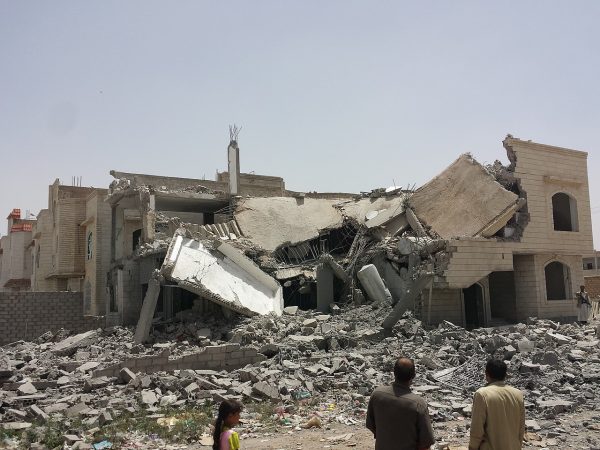
At the U.N. Security Council’s April 17 meeting on Yemen, China’s Deputy Permanent Representative to the U.N. Geng Shuang touted China’s success in helping to restore Iran-Saudi relations, expressing the wish that other Middle Eastern countries “follow the general trend” toward peace. Joining the United States in urging restraint from Houthi rebels, the representative said China is willing “to continue making efforts to promote regional peace and stability and realize lasting peace in Yemen.”
Geng’s speech would hardly seem noteworthy were it not for the fact that China’s rhetoric is accompanied by intensive diplomatic efforts. In just one month, China’s chargé d’affaires to Yemen, Shao Zheng, has held five separate meetings with members of Yemen’s Presidential Leadership Council, a body formed in April 2022 that takes over the powers of both president and vice president. To put this in context, Shao held only one such high-profile meeting from last November until this March.
Chinese coverage of these meetings has mostly focused on Yemeni praise for China’s mediation between Saudi Arabia and Iran, as well as thanks for Chinese economic assistance to the war-torn country. Both Shao and his interlocutors also agree on the desirability of reaching a speedy peace settlement. While they make no indication that China plans to take a leading role in bringing such a solution about, the press releases emphasize the role of “China and other countries” in helping to achieve a future breakthrough.
The Presidential Leadership Council was supposed to unite various anti-Houthi groups from both southern and northern Yemen. However, as Gregory Johnsen writes, finding common ground between the eight representatives has proven a difficult task. Apparently for that reason, Shao has been seeing leaders representing different interests. His recent diplomatic foray has included meetings with Council chairman and former presidential advisor Rashad al-Alimi, National Resistance leader Tareq Saleh, de facto leader of the Southern Movement Aidarus al-Zoubaidi, and pro-Western Governor Sultan Ali al-Arada.
In recent weeks, Shao has also met the U.N. Special Envoy’s military adviser Antony Hayward, as well as representatives of Sweden, the United Kingdom, and the European Union. Meanwhile, Yemen’s Ambassador to China Mohammed al-Maitami has been quoted by China’s Foreign Ministry as saying that “Yemen sincerely expects China to continue to play a role in promoting the political settlement of the Yemeni issue.” The diplomat recently met with China’s special envoy on Middle East issues, Zhai Jun.
As Trita Parsi from the Quincy Institute notes, the mere fact of China’s restoring relations between Saudi Arabia and Iran means Beijing will be able to take some credit for a possible peace in Yemen. This is because Riyadh and Tehran see the war in Yemen as their own proxy war, with Iran supporting Houthi rebels against the Saudi-backed government. If the two countries find a mutually satisfying way to wind down the conflict, it will be a result of Beijing’s mediation – even if China does not play a crucial role in the settlement.
However, China’s interest in mediating peace in Yemen is motivated by more than its desire to boost its diplomatic credentials. Chinese coverage of Shao’s meeting with al-Arada takes note of Yemen’s advantageous geographical location and richness in natural resources, concluding that it has much potential “waiting to be tapped.”
“It is hoped,” the summary continues, “that China can play an important role in Yemen’s post-war reconstruction and economic development.”
On a similar note, during his meeting with Saleh, Shao was apparently given to understand that China would be welcomed to “carry out economic and trade cooperation” under the framework of the Belt and Road Initiative (BRI). Only two weeks later, Shao met with representatives of the China Harbor Engineering Company’s Middle Eastern branch to discuss “the situation in Yemen and China-Yemen relations,” exchanging views on the Belt and Road. The CHEC focuses on infrastructure construction, and China is likely expecting it to become a key player in a potential post-war reconstruction of Yemen.
China’s diplomatic successes, therefore, appear to be paying dividends. Not only are they likely to boost Beijing’s credentials as a global peacebuilder, but they also promise to create a landscape receptive to Chinese investment. With the goodwill of many key Yemeni actors practically ensured, Chinese companies can look forward to scoring lucrative contracts if and when the war does finally come to an end.
After Iran-Saudi Mediation, China Angles for Another Diplomatic Victory in Yemen
Source: Frappler

0 Comments